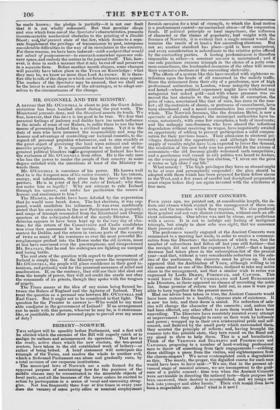BRIBERY—NORWICH.
THIS subject will be speedily before Parliament, and a fact will be elicited which the enemies of the Bill will eagerly catch at to malign its authors and misrepresent its operation. That fact is the ready, active share which the new electors, the ten-pound renters, have taken in the old established work of bribery—or rather of being bribed. A brief statement will anticipate the triumph of the Tories, and resolve the whole to another evil, which a Reformed Parliament can alone and gradually cure, by a total revision of our corporate institutions. The municipal laws of Norwich are a code framed for the apparent purpose of ascertaining how far the passions of the middle classes may be concentrated in the miserable objects of local party, and all the baseness of the lower orders be excited to action by participation in a series of venal and unceasing strug- gles. Not less frequently than four or five times in every year sloes the vacancy of some petty °thee or nominal employment furnish occasion for a trial of strength, to which the final motive is a predominant control—an unchecked abuse—of the corporation funds. If political principle or local importance, the influence of character or the claims of popularity, had weight with the freemen of Norwich, it is evident that a single- contest would des termine the result of at least a few succeeding elections. But not so; another standard has place—gold is here omnipotent, and every consideration is subordinate to the relative price offered . by the contending parties. A lasting predominance is therefore impossible to either—a constant see-saw is maintained ; 'and if one side purchase ruinous triumph in the choice of a petty com- mon-councilman, the husbanded resources of the other will secure their expensive elections at the succeeding shrievalty. The effects of a system like this have recoiled with righteous re- tribution upon the heads of all concerned in the unholy traffic. Since the retirement from their city of a gentleman, now of high professional estimation in London, whose integrity they revered and hated—whose political supremacy might have withstood any antagonist but naked gold—and with whose presence was re- moved the last obstacle to the swelling tide of corruption, the price of votes, ascertained like that of corn, has risen in the mar- ket ; all the restraints of sharrie, or pretences of concealment, have been abandoned ; and a moral contamination has overspread the whole. The Norwich freeman, like the drunken Helot, is now a spectacle of absolute disgust; the municipal authorities have be- come, notoriously, with some few exceptions, a body of insolvents; and the unhappy non-freemen, who have shared the infectious • degradation without receiving its wages, have impatiently awaited an opportunity of adding to present participation a solid compen- sation for their previous losses. Their admission to electoral pri- vileges furnished the opportunity ; and although the increased supply of venality might have been expected to lower the demand, the resolution of the new body was too powerful for the axioms of economists—the old freemen gladly welcomed such competition; and a ,gentleman well versed in city politics was beard to declare, on the evening preceding the last election, "I diver see the price o' votes so 'igh afore i' any life." What remedy ? The high privileges they have so abused ought to be at once and peremptorily suspended : the plan should be adopted with them which has been proposed for their fellow slaves in the West, and a few years of careful and disciplined preparation must elapse before they are again invested with the attributes of free men.












 Previous page
Previous page